BANDď SH█CHď
III (坂東秀調)
11/07/1880 - 09/22/1935
JUNE 1917
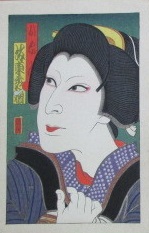
Band˘ Shűch˘ III (坂東秀調) as
Oen (おえん; お娟)
Play: Koi Bikyaku Yamato ďrai
(恋飛脚大和往来)
Performance Place: Meiji-za, Tokyo
Performance Date: 06/03/17
Print Date: 09/15/17
Artist: Fujisawa Tatsuo
(藤澤龍雄; 藤沢竜雄)
Series: [Fujisawa Print Set #1]
Personal Collection
JANUARY 1918
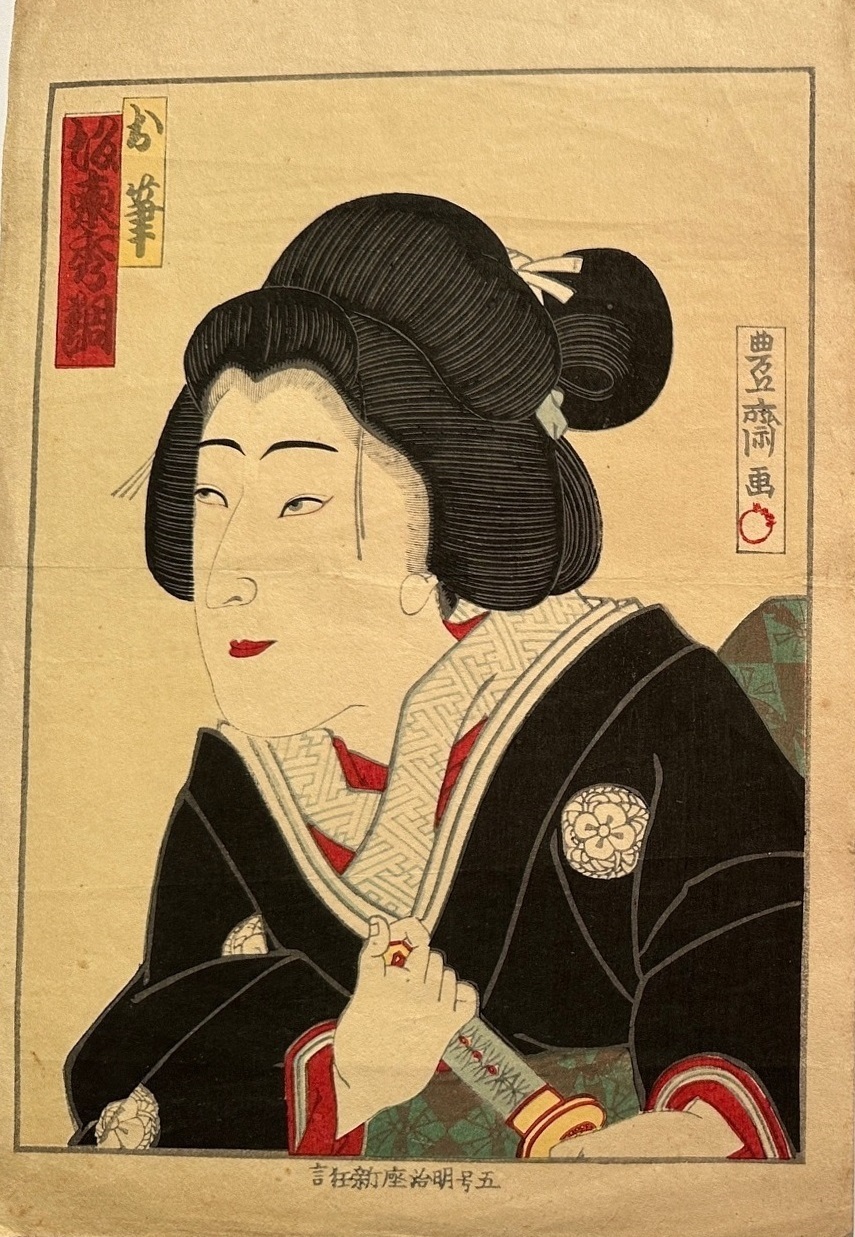
Band˘ Shűch˘ III as Ofude (お筆)
Play: Hirakana Seisuiki (ひらかな盛衰記)
Performance Place: Meiji-za, Tokyo
Performance Date: 01/02/18
Print Date: 01/1918?
Artist: Utagawa Kunisada III (歌川国貞)
Series: Chiyo ni Sakaeru Kabuki no Irodori
(千代 栄劇彩) #5
^Personal Collection

Band˘ Shűch˘ III (坂東秀調) as
Ofude (お筆)
Play: Hirakana Seisuiki
(ひらがな盛衰記)
Performance Place: Meiji-za, Tokyo
Performance Date: 01/02/18
Print Date: 01/1918?
Artist: Utagawa Kunisada III
(歌川国貞)
Medium: woodblock printed
senshafuda
Personal Collection
OCTOBER 1918

Band˘ Shűch˘ III (坂東秀調) as
Niho Teru Tayű (鳰照太夫)
Play: Niho no Ukisu (鳰の浮巣; にほの浮巣)
Performance Place: Shintomi-za, Tokyo
Performance Date: 10/04/18
Print Date: 10/1918?
Artist: Utagawa Kunisada III (歌川国貞)
Series: Chiyo ni Sakaeru Kabuki no Irodori
(千代 栄劇彩)
Personal Collection
NOVEMBER 1918

Band˘ Shűch˘ III (坂東秀調) as
Koume (小梅)
Play: Mukae Kago [Koume Yoshibŕ]
(迎駕篭 [小梅由兵衛])
Performance Place: Meiji-za, Tokyo
Performance Date: 11/05/18
Print Date: 11/1918?
Artist: Utagawa Kunisada III (歌川国貞)
Series: Chiyo ni Sakaeru Kabuki no Irodori
(千代 栄劇彩)
Personal Collection
JANUARY 1920

Band˘ Shűch˘ III (坂東秀調) as
Tokiwa Gozen (常盤御前)
Play: Ichij˘ ďkura Monogatari
(一條大蔵譚),) which appears
to be a version of Act IV, Scene 3 of
Kiichi H˘gen Sanryaku no Maki
(鬼一法眼三略巻)
Performance Place: Meiji-za, Tokyo
Performance Date: 01/03/20
Print Date: 01/1920?
Artist: Utagawa Kunisada III (歌川国貞)
Series: Chiyo ni Sakaeru Kabuki no Irodori
(千代 栄劇彩)
Personal Collection
JUNE 1920
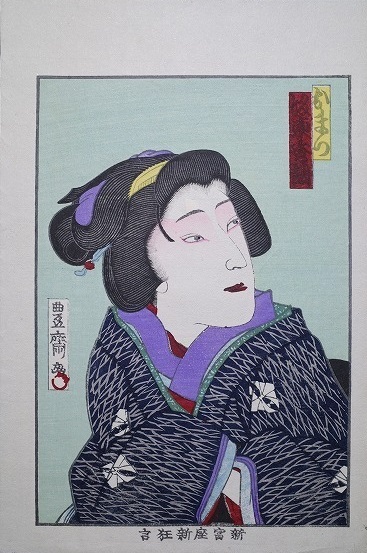
Band˘ Shűch˘ III (坂東秀調) as
Omatsu (おまつ)
Play: Kamiko Jitate Ry˘men Kagami
(紙子仕立両面鑑)
Performance Place: Shintomi-za, Tokyo
Performance Date: 06/08/20
Print Date: 06/1920?
Artist: Utagawa Kunisada III (歌川国貞)
Series: Chiyo ni Sakaeru Kabuki no Irodori
(千代 栄劇彩)
Personal Collection
DECEMBER 1922

Band˘ Shűch˘ III (坂東秀調) as Sadarae
(簓江)
Ichikawa Chűsha VII (市川中車) as Chinzei Hachir˘ Tametomo (鎮西八郎為朝)
Kataoka Ichiz˘ IV (片岡市蔵) as Oni Yasha (鬼夜叉)
Plays: Muromachi Gosho (室町御所); Aki no Wakare (秋の別れ); Nani ďshima
Homare no
Tsuyoyumi (名大島功譽強弓); Honch˘ Nijűshik˘ (本朝廿四孝)
Performance Place: Teikoku Gekij˘, Tokyo
Performance Date: 12/01/22
Print Date: 12/1922?
Artist: Torii Kiyotada (鳥居清忠)
Medium: Woodblock printed ehon sujigaki cover
Image courtesy of the Tsubouchi Memorial Theatre Museum
Note: The cover also depicts Nakamura Jakuemon III (中村雀右衛門) as
Yaegaki-hime (八重垣姫) and
Onoe Matsusuke IV (尾上松助) as Uesugi Kenshin (上杉謙信) in Honch˘
Nijűshik˘ (本朝廿四孝); and
Ichikawa Sumiz˘ VI (市川寿美蔵; 市川壽美蔵) as Yoshiteru (義輝), Ichikawa
Sansh˘ V (市川三升;
市川三舛) as Iwatsuki Suisuke (岩槻主水助), Ichikawa Sadanji II (市川左団次)
as Ikeda Tango no Kami
Masatake (池田丹後守将武), and Sawamura S˘nosuke I (沢村宗之助; 澤村宗之助) as
Tamon (多門) in
Muromachi Gosho (室町御所).
MAY 1924
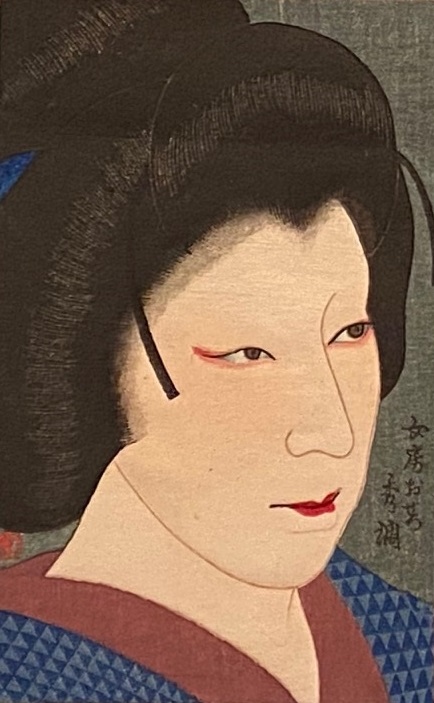
Band˘ Shűch˘ III (坂東秀調) as
Ny˘b˘ Osetsu (女房おせつ)
Play: Keian Taiheiki (慶安太平記)
Performance Place: Asakusa Sh˘chiku-
za, Tokyo
Performance Date: 05/03/24
Print Date: 1928?
Artist: Kamishita Chikamine
(神下周峯)
Medium: Woodblock printed
pochibukuro
Series: [Images of Famous Actors of
Today] T˘sei Meiyű Omokage Z˘shi
(當世名優面影双紙) #8
Personal Collection
MARCH 1925
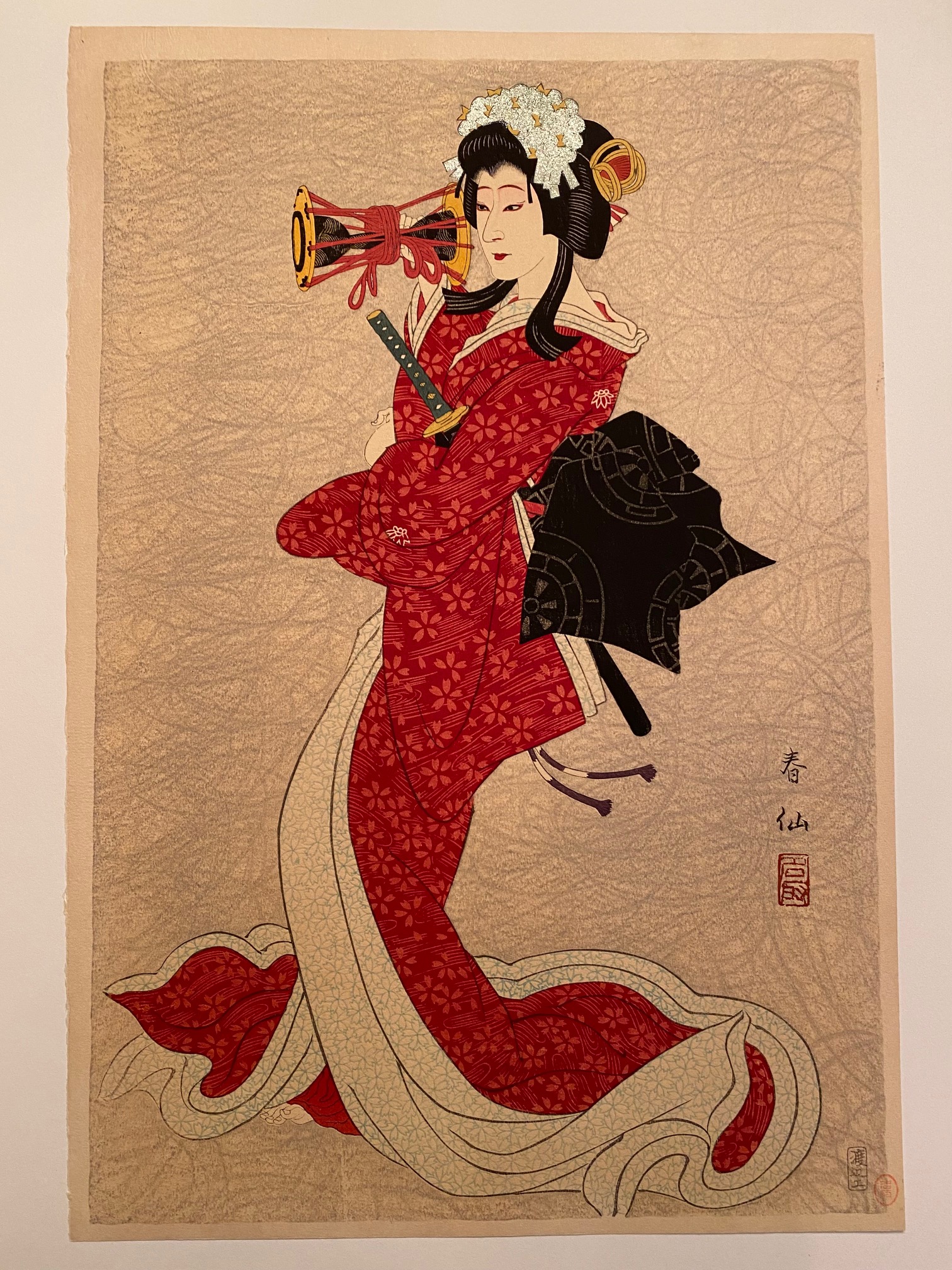
Band˘ Shuch˘ III (坂東秀調) as
Shizuka Gozen (静御前)
Play: Michiyuki Hatsune no Tabi (道行初音旅), Act IV,
Scene 1 of Yoshitsune Senbon Zakura (義経千本桜)
Performance Place: Kabuki-za, Tokyo
Performance Date: 03/06/25
Print Date: 1925
Artist: Natori Shunsen (名取春仙)
Series: S˘saku Hanga: Shunsen Nigao-e Shű
(創作版画 春仙似顔集) (#7)
Personal Collection
AUGUST 1926

[Kabuki Manga]
Print Date: 1927
Artist: ?
Medium: Machine printed lithograph
Personal Collection
Note: It is unlcear if this is from the same magazine as
Eiga SutÔ Sugao - Manga Hogoita (1927) by Kitazawa
Rakuten shown elsewhere on this site. The two pieces were
acquired from the same dealer at the same time and are
ascribed the same date, but appear to bear different artist
signatures.

Ichikawa
Ennosuke II (市川猿之助) as
Shiinkichi (新吉)
Band˘
Shűch˘ III (坂東秀調) as
Ohisa
(お久)
Play:
Shinkei Kasane-ga-Fuchi (真景累ヶ淵)
Performance Place: Kabuki-za, Tokyo
Performance Date: 08/10/26
Artist: ?
Medium:
Machine printed lithograph
Personal
Collection
NOVEMBER 1928

Band˘ Shűch˘ III (坂東秀調) as Okaru (お軽)
Play: Kanadehon Chűshingura
(仮名手本忠臣蔵; 假名手本忠臣蔵)
Performance Place: Hong˘-za, Tokyo
Performance Date: 11/01/28
Print Date: 1950 or later
Artist: Ota Gak˘ (太田雅光)
Series: Meifu Miyage Geki no Omokage
(冥府苞苴劇容彩) (#16)
Medium: ?
Image courtesy of the Tsubouchi Memorial Theatre Museum
Note: It is unclear if this is a woodblock print, a watercolor
drawing, or a hand-colored keyblock print for an
unpublished design. Shűch˘ III died on September 22,
1935 at age 56. He first played the role of Okaru in
Tokyo in April 1912, and his final Tokyo appearance in
this role was in December 1929 at the Shinjuku
Shinkabuki-za. This print, however, closely resembles
a photograph from the November 1928 production at
the Hong˘-za.

Sawamura Tosshi VIII (沢村訥子; 澤村訥子) as Ono no Sadakur˘ (斧定九郎)
Ichikawa Ensh˘ III (市川莚升; 市川莚舛) as Kaoyo (顔世)
ďtani Tomoemon VI (大谷友右衛門) as Takano Moronao (高野師直)
Ichikawa Sumizo VI (市川寿美蔵) as Momoi Wakasanosuke (桃井若狭之助)
Band˘ Shűch˘ III (坂東秀調) as Okaru (おかる)
Ichikawa Sumiz˘ VI (市川寿美蔵; 市川壽美蔵) as Hayano Kanpei (早野勘平)
ďtani Tomoemon VI (大谷友右衛門) as ďboshi Yuranosuke (大星由良之助)
Band˘ Shűch˘ III (坂東秀調) as En'ya Hangan (塩谷判官)
Play: Kanadehon Chűshingura (仮名手本忠臣蔵; 假名手本忠臣蔵)
Performance Place: Hong˘-za, Tokyo
Performance Date: 11/01/1928
Print Date: 11/1928?
Artist: ?
Medium: Machine lithograph printed? ehon sujigaki cover
Image courtesy of the Tsubouchi Memorial Theatre Museum

Play: Kanadehon Chűshingura (仮名手本忠臣蔵; 假名手本忠臣蔵)
Performance Place: Hong˘-za, Tokyo
Performance Date: 11/01/28
Print Date: 11/1928?
Artist: ?
Medium: Machine lithograph printed? ehon sujigaki back cover
Image courtesy of the Tsubouchi Memorial Theatre Museum
UNKNOWN DATES
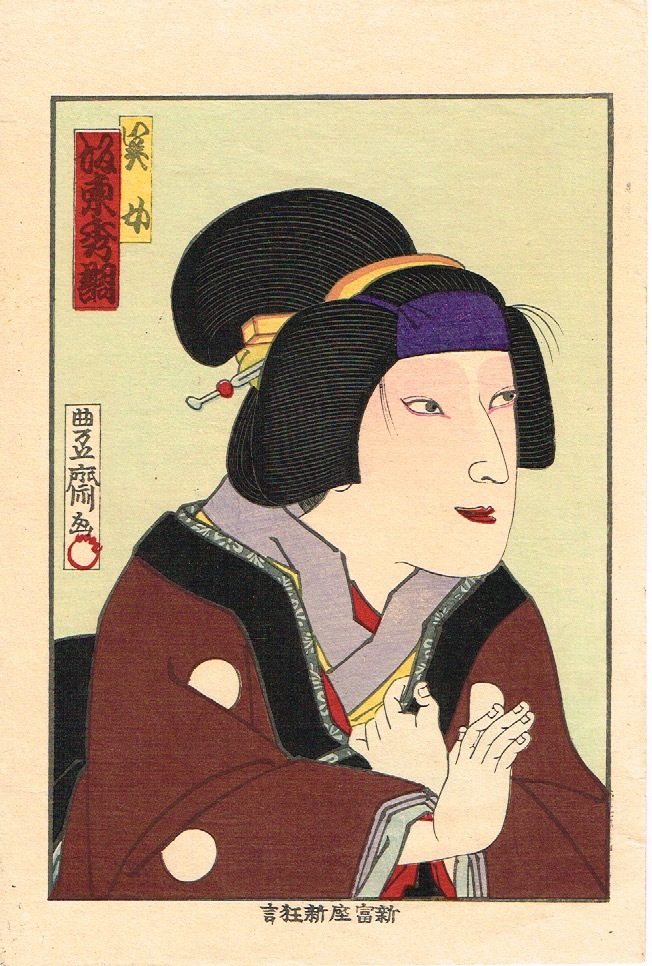
Band˘ Shűch˘ III (坂東秀調) as Bijin (美女)
Play: ?
Performance Place: Shintomi-za, Tokyo
Performance Date: ?
Print Date: c. 1917-1920
Artist: Utagawa Kunisada III (歌川国貞)
Series: Chiyo ni Sakaeru Kabuki no Irodori
(千代 栄劇彩)
Personal Collection

Band˘ Shűch˘
III (坂東秀調) as
Nureginu (濡衣)
Play: Honch˘ Nijűshik˘
(本朝廿四孝)
Artist: ?
Medium: Woodblock printed
matchbook cover
Note:
Shűch˘ III performed this
role in
Tokyo at the Hong˘-za in
November
1913 and at the
Teikoku
Gekij˘ in December
1922.












